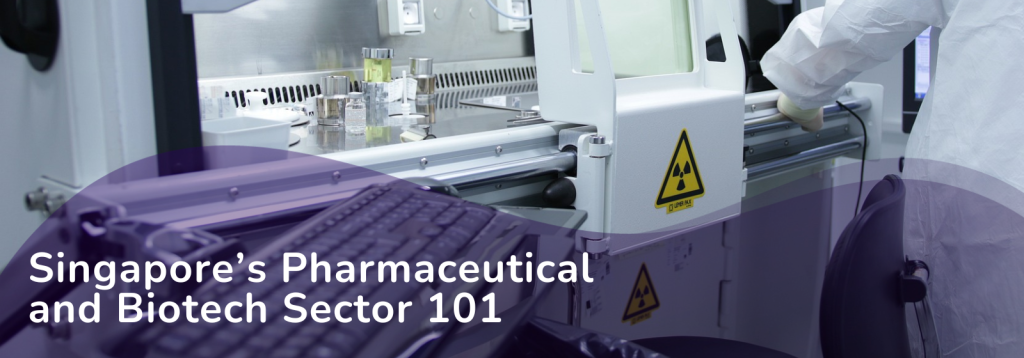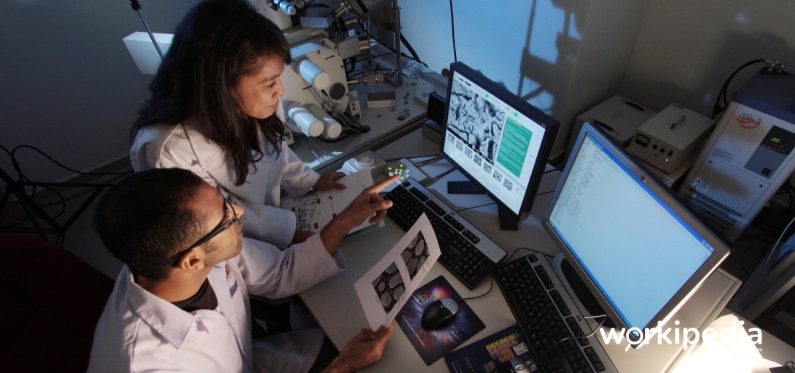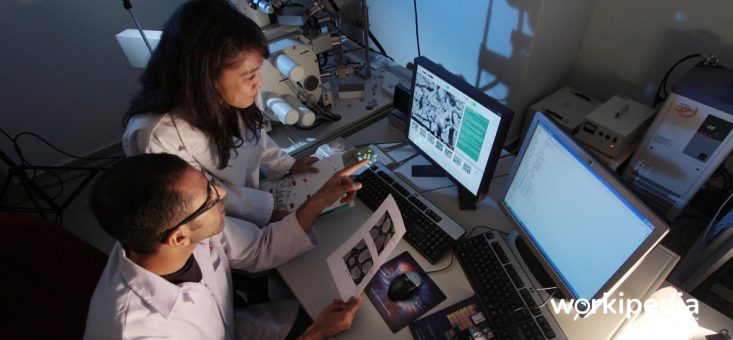About Singapore’s pharmaceutical and biotech sector
Over the last three decades, the Singapore government has sustained investments in research, innovation, and enterprise (RIE), with the RIE2025 plan dedicating about S$25 billion to research and development (R&D).
For context, Singapore’s RIE 2025 Plan reinforces its commitment to long-term investments in enterprise development, and establishes Singapore as a leading global hub for innovation and intellectual property (IP) development. It was also announced that an additional $3 billion will be injected to deepen capabilities in new growth areas by Deputy Prime Minister Heng Swee Heat at the 2024 Budget Statement.
Singapore’s R&D efforts have yielded positive societal outcomes and economic growth. In 2021, there were more than 25,000 people working in the field, many of whom had high-paying and high-value jobs. This strong collaboration among ecosystem players in striving towards a common goal was one of the key reasons that is attractive to Singapore.
Size of the job market
These early investments also contributed to the transformation of the biomedical sector into one of Singapore’s key economic pillars today.
They have also led to a rush of other biotech and pharmaceutical companies, such as GSK, BioNTech, and Sanofi, to establish manufacturing bases in Singapore.
Chinese firm WuXi Bio is also spending $1.4bn in the next decade to build research and development, large-scale drug substance, and drug product manufacturing locally as well.
Their new site is anticipated to employ 1,500 research development and manufacturing staff when complete and has been supported by Singapore’s Economic Development Board (EDB).
Dr Beh Swan Gin, Chairman of EDB, said in a press release: “(Such) investments will establish Singapore as a significant node in the company’s global research, development and manufacturing network.”
“(They are) testament to Singapore’s position as a global biopharmaceutical hub and will strengthen our attractiveness to biotech innovators and start-ups.”
In addition, New Jersey-based Merck opened a new secondary packaging facility for vaccines and biologics in 2022, and recently broke ground on a new plant that will produce inhalers that are set for completion in 2026.
Both factories are in Tuas, and part of an outlay of up to $500m, bringing their total investment over nearly three decades in Singapore to $2bn. Their latest investment will also add more than 100 jobs, which takes their employee force locally to more than 1,800, according to recent market reports.
Based on a recent report by global strategy firm LEK Consulting reported by A*STAR, the number of Singapore-based biotechnology companies grew substantially from seven in 2012 to 52 in 2022, with this number projected to increase by over 61.5%between 2022 and 2032.
Why is this sector important to Singapore’s economy?
As a leading biomedical sciences hub at the heart of Asia, Singapore is the choice location for companies to develop and produce new products that better meet Asia’s healthcare needs. Companies benefit from our pro-business environment, infrastructure, talent and innovation ecosystem, as well as our proximity to the rest of Asia.
Companies like GSK, MSD and Roche have based a range of commercial activities, including supply chain management, regulatory affairs and medical affairs in Singapore.
Our extensive and integrated research ecosystem continues to deliver impact and value to pharmaceutical companies. Here, firms can forge partnerships with key opinion leaders, institutes, as well as clinical and contract research organisations to rapidly advance pipeline assets.
Human health and potential is one of the four strategic domains under the $25 billion in funding that Singapore has committed to public sector research.
As drug discovery and development models continue to evolve amid productivity challenges for in-house R&D, globally leading pharmaceutical companies such as Johnson & Johnson are establishing external innovation teams in Singapore to partner emerging biotech companies to bring innovative therapies to market faster.
Growth areas and outlook for the pharmaceutical and biotech sector
One of Singapore’s most ambitious initiatives in the sector is Precision Health Research Singapore (PRECISE) — a central entity implementing Singapore’s National Precision Medicine Strategy across government, research and health clusters and private industries.
The genomes of 100,000 Singaporeans are being sequenced with the goal of creating an Asian reference genome that addresses the underrepresentation of Southeast Asian populations in existing genomic datasets. PRECISE has also put in place robust data governance measures to ensure data privacy and protection.
Singapore has also created the Asian neTwork for Translational Research and Cardiovascular Trials (ATTRaCT), which uses genetic, clinical, and imaging data from an existing study on heart failure that spans 11 countries in Asia.
The ATTRaCT platform integrates top expertise in cardiovascular clinical and biomedical sciences across the nation, bringing together A*STAR research institutes, with Singapore’s national heart institutions as well as academic institutions.
ATTRaCT will provide valuable insights to guide R&D on cardiovascular disease progression, enabling the discovery of new drug targets and drug repurposing to improve clinical strategies for Asian patients with heart failure.
Mid-career switch: Why is the pharmaceutical and biotech sector a good choice?
Ultimately, the sector will need talent at three levels of seniority: Junior, manager, and C-suite/board. However, according to new research by SGInnovate, talent shortages continue to pose challenges for companies in the sector.
A report entitled “Bridging the Talent Gaps in Singapore’s Biotech Sector”, commissioned by ecosystem builder and investor SGInnovate, and conducted by global strategy firm LEK Consulting revealed that shortage of key talent across the various functions and experience levels in the biotech sector, that will grow by about 30% by 2023. It also highlighted these key roles urgently needing talent below:
- Research & development
- Production
- Regulatory affairs
- Business management
What’s the salary like in the pharmaceutical and biotech sector?
Jobs in the pharmaceutical and biotech sector cover a broad spectrum of roles, and salaries do vary depending on the specific job function, level of experience and qualifications.
Here are some examples listed on the MyCareersFuture portal:
| Role | Salary Range (Monthly) |
| CSV Engineer (Pharma/Biotech) | $4,500 to $9,000 |
| Senior Supply Chain Compliance (Biotech) | $6,000 to $8,000 |
| Pharma Warehouse Specialist | $4,500 to $6,000 |
| Laboratory Analyst | $3,000 to $5,000 |
| Validation Engineer (Pharma/Biotech) | $5,500 to $7,500 |
| M&E Facilities Specialist | $6,000 to $11,500 |
| Admin Support (Plant Setup, Biotech Pharma) | $4,000 to $4,500 |
| Production Supervisor (Pharma MNC) | $5,000 to $6,000 |
| Sales Executive for Active Pharma Ingredient (API) | $3,000 to $5,000 |
| Senior Marketing Executive | $4,500 to $6,500 |
What courses or skills are needed to join the pharmaceutical and biotech sector?
As the sector continues to transform, these are some examples of skills in demand now and in the future. Those seeking successful careers in the sector can set themselves apart by developing these attributes and acquiring these skills in demand, according to SkillsFuture’s Skills Framework here:
Desired attributes:
- Analytical:You enjoy analysing things from all angles to solve problems.
- Integrity: You demonstrate sound moral and ethical principles at work in relationships with co-workers and stakeholders.
- Meticulous: You pay attention to details and accuracy.
- Responsible: You recognise the implicit obligation on accountability to ensure work processes run reliability and efficiently.
- Safety-minded: You recognise the implicit responsibility for ensuring safe work practices and conditions in a high-risk environment.
- Team Player: You understand that each person is part of a larger team working together to bring about success at the workplace.
Skills in demand:
- Continuous Manufacturing Skills: Enable continuous flow, end-to-end manufacturing strategies
- Compliance and Regulatory Affairs Skills: Manage regulatory issues set by international regulatory authorities to meet regulatory demands throughout the life of a product
- Green Manufacturing Skills: Innovate and enable ecologically friendly processes to support sustainable green manufacturing
- Multi-product Operations Skills: Apply processes to manufacture variety of products with different specifications
- Process Analytical Technology Skills: Apply automated process control methods throughout the value chain of the product
- Quality by Design Skills: Integrate target product quality into biopharmaceuticals manufacturing processes
In fact, as early as 2020, Career Conversion Programmes (CCPs) were launched to help mid-career professionals, managers, executives and technicians (PMETs) join the sector.
The programme aims to equip trainees with skills to take on new roles in the field of biopharmaceutical manufacturing, such as biotechnologists and production engineers.
They will undergo full-time training, which comprises three months of classroom training at either Singapore Polytechnic or Temasek Polytechnic, and 15 months of structured on-the-job training attachment with host companies.
Depending on the availability of job vacancies and their work performance, trainees may be offered full-time positions at the end of the programme.
EDB’s Senior Vice-President of Healthcare Ms Goh Wan Yee said the scope of the CCP will “equip Singaporeans with the skills required to capture opportunities in new areas such as small molecule pharmaceuticals while augmenting the existing talent pool”.
Ms Julia Ng, Assistant Chief Executive at Workforce Singapore (WSG), added that jobseekers “should cast their nets wider, embrace reskilling and (look) beyond the familiar to grasp hold of these opportunities”.
“Together with EDB and our industry partners, we will help them cut through the uncertainties in the new normal by spotlighting sectors with growth potential and accelerating their advancement into these jobs.”
Types of jobs in the pharmaceutical and biotech sector
Some of the common roles in the sector include the following:
- Operation Excellence Manager
- Process Development/ MS&T Engineer
- Quality Assurance Assistant
- Quality Control Laboratory Analyst/Chemist/Microbiologist
- Production Senior Technician
- Production Biotechnologist
- Engineering and Maintenance Technician
- Site Director/Head
Jobseekers or mid-career switchers who are keen on joining the PE sector can get support and on-the-job training by signing up for the following Career Conversion Programmes for the sector by Workforce Singapore:
- Biomedical: CCP for Biomedical Manufacturing Operators (New Hires RnF)
- Biomedical: CCP for Biomedical Manufacturing Professionals (New Hires PMET)
Getting excited about joining the industry? Read on for more insights and information on how you can join Singapore’s pharmaceutical and biotech sector, and what to look forward to below!

Salary Guide Singapore 2023: Biomedical Industry
What’s it Like Working in the Biopharmaceutical Manufacturing Industry?
Top 3 Reasons Why You Should Take Up a Lab Technician Job















